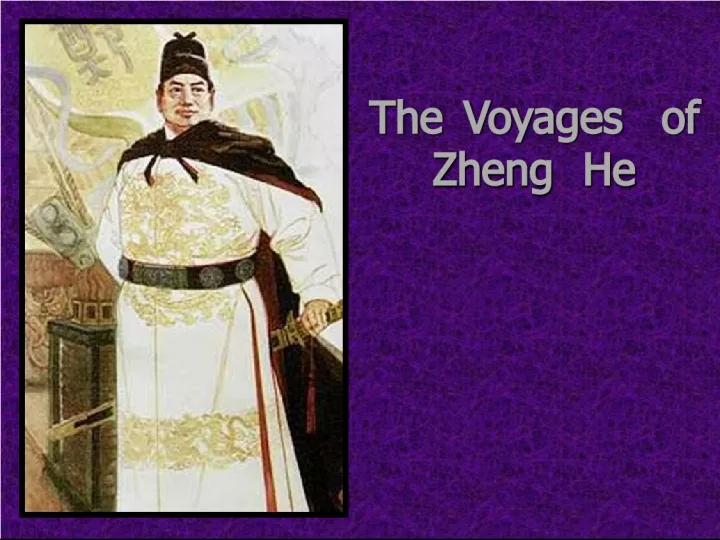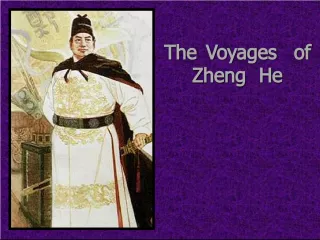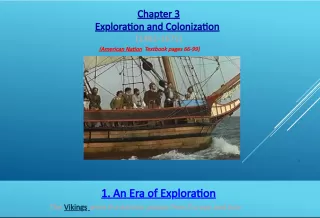The Voyages of Zheng He


From 1405 until 1433, Admiral Zheng He led seven voyages with the purpose of establishing trade and diplomatic relations between China and nations in Southeast Asia, South Asia, and the Arabian
- Uploaded on | 1 Views
-
 kellyjensen
kellyjensen
About The Voyages of Zheng He
PowerPoint presentation about 'The Voyages of Zheng He'. This presentation describes the topic on From 1405 until 1433, Admiral Zheng He led seven voyages with the purpose of establishing trade and diplomatic relations between China and nations in Southeast Asia, South Asia, and the Arabian. The key topics included in this slideshow are . Download this presentation absolutely free.
Presentation Transcript
Slide1The Voyages of Zheng He The Voyages of Zheng He
Slide2From 1405 until 1433, Admiral Zheng He made 7 voyages. From 1405 until 1433, Admiral Zheng He made 7 voyages. The purpose of the voyages was to establish trade and diplomatic relations between China and nations in Southeast Asia, South Asia, and the Arabian Peninsula.
Slide3The fleets ranged in size from 48 to 317 ships carrying 27,000 to 30,000 sailors, soldiers, merchants, and scholars. The fleets ranged in size from 48 to 317 ships carrying 27,000 to 30,000 sailors, soldiers, merchants, and scholars. http://www.slideshare.net/gsill/zheng-he- 14232704
Slide4One of Zheng He’s treasure Ships One of Zheng He’s treasure Ships
Slide5The ships used maps, star charts, and compasses to navigate the open seas. It is the first fleet in history to not hug the coast as a means of guidance. The ships used maps, star charts, and compasses to navigate the open seas. It is the first fleet in history to not hug the coast as a means of guidance.
Slide6They took silk, porcelain, and copper coins to trade for spices, gems, fragrant woods, animals, textiles, and minerals. They took silk, porcelain, and copper coins to trade for spices, gems, fragrant woods, animals, textiles, and minerals.
Slide7Throughout each voyage, detailed maps were made, information gathered on the climate and cultures encountered, and plant and animal specimens were collected. Throughout each voyage, detailed maps were made, information gathered on the climate and cultures encountered, and plant and animal specimens were collected.
Slide8The first voyage, 1405-1407, visited Southeast Asia. Impressed with China’s wealth and power, local rulers sent ambassadors back with the fleet to pay tribute (money and goods) to the emperor. The first voyage, 1405-1407, visited Southeast Asia. Impressed with China’s wealth and power, local rulers sent ambassadors back with the fleet to pay tribute (money and goods) to the emperor.
Slide9The second (1407-1409) and third (1409-1411) voyages returned to the same areas and to some new ones, including Siam (Thailand) and Ceylon (Sri Lanka). The second (1407-1409) and third (1409-1411) voyages returned to the same areas and to some new ones, including Siam (Thailand) and Ceylon (Sri Lanka).
Slide10The fourth voyage, 1413-1415, reached Hormuz and Aden on the Arabian Peninsula. These two ports controlled the rich trade routes of the Persian Gulf and the Red Sea. He returned home with riches from Arabia and Africa, and more ambassadors. The fourth voyage, 1413-1415, reached Hormuz and Aden on the Arabian Peninsula. These two ports controlled the rich trade routes of the Persian Gulf and the Red Sea. He returned home with riches from Arabia and Africa, and more ambassadors.
Slide11The fifth voyage, 1416- 1419, returned to the places in Southeast Asia, Ceylon, India, Hormuz, and the Arabian Peninsula that had been visited before. The fleet also sailed down the east coast of Africa making stops at Mogadishu and Malindi. He returned home with exotic animals and African ambassadors. The fifth voyage, 1416- 1419, returned to the places in Southeast Asia, Ceylon, India, Hormuz, and the Arabian Peninsula that had been visited before. The fleet also sailed down the east coast of Africa making stops at Mogadishu and Malindi. He returned home with exotic animals and African ambassadors.
Slide12The sixth voyage, 1421-22, returned ambassadors to various countries, but concentrated on the Arabian Peninsula and East Africa. Zheng He, a Muslim, is thought to have made the hajj during this voyage. The sixth voyage, 1421-22, returned ambassadors to various countries, but concentrated on the Arabian Peninsula and East Africa. Zheng He, a Muslim, is thought to have made the hajj during this voyage.
Slide13The seventh voyage, 1430-1433, revisited Champa, Java, Sumatra, Malacca, Ceylon, Calicut, and Hormuz. The seventh voyage, 1430-1433, revisited Champa, Java, Sumatra, Malacca, Ceylon, Calicut, and Hormuz.
Slide14With Zheng He’s death, the voyages ended and the fleet was dispersed. Over the course of 28 years, they had restored China’s diplomatic and trade relations, freed the ocean routes from Asia to India and Arabia of pirates, and established Chinese communities that exist today in many of the places they had visited. With Zheng He’s death, the voyages ended and the fleet was dispersed. Over the course of 28 years, they had restored China’s diplomatic and trade relations, freed the ocean routes from Asia to India and Arabia of pirates, and established Chinese communities that exist today in many of the places they had visited.
Slide15IsolationismIsolationism a policy adopted by China of isolating the empire from the affairs of other nations by declining to enter into alliances, trade agreements, or overseas exploration. China sought to devote the entire efforts of the empire to its own advancement and remain at peace by avoiding foreign entanglements and responsibilities to foreign countries.
Slide16PositivesPositives
Slide17NegativesNegatives
Slide18Here is what China controlled after Zheng He’s voyages. Here is what China controlled after Zheng He’s voyages.
Slide19Here is what Europe controlled after the Age of Exploration. North and South America Here is what Europe controlled after the Age of Exploration. North and South America
Slide20AfricaAfrica
Slide21AustraliaAustralia

